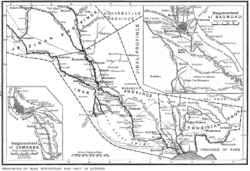Sawad
For other uses, see Sawad (disambiguation).

Map of the Sawad ("Iraq") under the Abbasid Caliphate
Sawad was the name used in early Islamic times (7th–12th centuries) for the southern Iraq. It means "black land" and refers to the stark contrast between the alluvial plain of Mesopotamia and the Arabian desert. Under the Umayyad and Abbasid Caliphates, it was an official political term for a province encompassing most of modern Iraq (except for the western desert and al-Jazira in the north).
As a generic term, it was used to denote the irrigated and cultivated areas in any district.
Sources
- Schaeder, H.H. (1997). "Sawād". The Encyclopedia of Islam, New Edition, Volume IX: San–Sze. Leiden and New York: BRILL. p. 87. ISBN 90-04-09419-9.
- Michele Campopiano, “Land Tax Alā l-misāḥa and muqāsama: Legal Theory and Balance of Social Forces in Early Medieval Iraq (Sixth to Eighth Centuries)”, in Journal of the Economic and Social History of the Orient, 54/2, 2011, 239-269
This article is issued from Wikipedia - version of the 3/4/2016. The text is available under the Creative Commons Attribution/Share Alike but additional terms may apply for the media files.